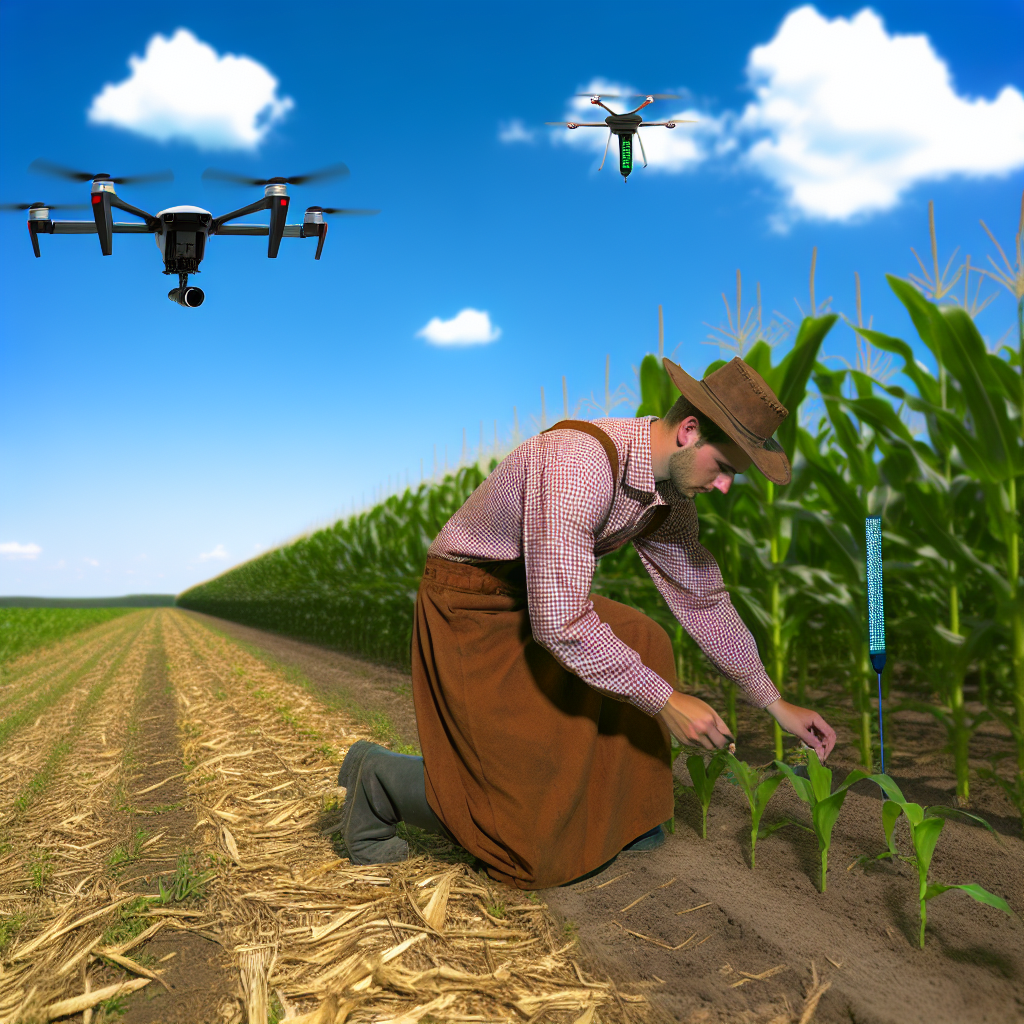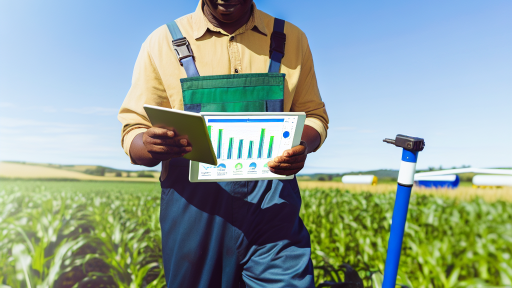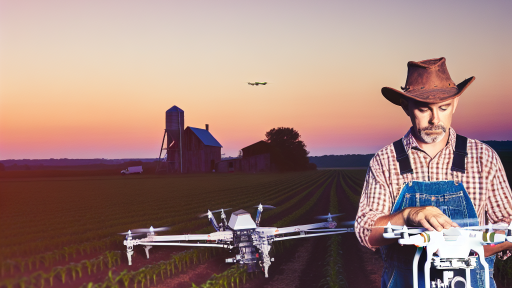Introduction to Precision Agriculture and its Importance
Precision agriculture represents a significant shift in farming practices.
This method utilizes advanced technologies for more efficient farming.
Farmers now can optimize yields while minimizing resource use.
Moreover, it addresses the increasing demands for food production.
Technology allows for better data collection and analysis.
Farmers can make informed decisions based on real-time data.
Consequently, this approach fosters sustainable farming practices.
Understanding Precision Agriculture
Precision agriculture uses technology to monitor field variability.
It involves tools such as GPS, sensors, and drones.
These tools help assess soil and crop conditions.
Farmers can apply inputs more accurately and efficiently.
Benefits of Adopting Precision Agriculture
This technique leads to significant cost savings for farmers.
It reduces waste by optimizing the use of seeds and fertilizers.
Moreover, it enhances crop yields, contributing to profitability.
Farmers experience improved soil health through targeted practices.
Transform Your Agribusiness
Unlock your farm's potential with expert advice tailored to your needs. Get actionable steps that drive real results.
Get StartedAdditionally, they can better manage water resources.
Ultimately, these benefits translate to more sustainable practices.
Challenges in Implementation
Despite its advantages, precision agriculture faces some challenges.
The initial investment in technology can be substantial.
Moreover, farmer education and training are crucial for success.
Data management also presents a challenge for many operations.
However, overcoming these barriers opens doors to greater efficiency.
The Future of Precision Agriculture
The future looks promising for precision agriculture.
Innovations continue to enhance the capabilities of farming technologies.
Increasing climate variability necessitates adaptive strategies.
Thus, precision agriculture will play a vital role in food security.
Furthermore, collaborative efforts in the industry can accelerate adoption.
Overall, embracing these technologies will pave the way for sustainable agriculture.
Overview of Cost Benefits in Agriculture
Financial Savings
Precision agriculture reduces input costs significantly.
Farmers can save on seeds, fertilizers, and pesticides.
By optimizing resource use, they increase efficiency.
This approach minimizes waste and boosts profit margins.
Enhanced Yield and Production
Using precision agriculture leads to higher crop yields.
Farmers can effectively monitor crop health and growth.
This technology allows for precise irrigation methods.
Consequently, crops receive the right amount of water.
Soil Health Improvement
Precision practices enhance soil health over time.
Farmers can apply fertilizers only where needed.
This reduces chemical runoff and soil degradation.
Showcase Your Farming Business
Publish your professional farming services profile on our blog for a one-time fee of $200 and reach a dedicated audience of farmers and agribusiness owners.
Publish Your ProfileAs a result, the soil retains its nutrients better.
Environmental Benefits
Adopting precision agriculture promotes environmental sustainability.
The use of drones and sensors minimizes chemical applications.
This technology also conserves water through efficient usage.
Ultimately, it helps protect local ecosystems.
Market Competitiveness
Farmers who adopt advanced methods gain a competitive edge.
This innovation attracts more customers and buyers.
Improved product quality meets higher market standards.
Thus, farmers benefit from increased demand for their produce.
Data-Driven Decision Making
Precision agriculture relies heavily on data analysis.
Farmers gain insights into weather patterns and soil conditions.
This information supports informed decision-making processes.
Consequently, it mitigates risks associated with farming.
Reduction in Input Costs through Precision Agriculture
Efficient Resource Management
Precision agriculture optimizes the use of resources on the farm.
This efficiency reduces overall input costs significantly.
Farmers can apply fertilizers and pesticides more accurately.
Consequently, they use fewer chemicals while maintaining crop health.
This approach also minimizes waste and environmental impact.
Data-Driven Decisions
Farmers utilize data analytics to make informed decisions.
This data includes soil health, moisture levels, and weather patterns.
By analyzing this information, farmers can fine-tune their practices.
As a result, they achieve better yields with lower input costs.
Thus, precision agriculture enhances productivity and profitability.
Utilizing Advanced Technology
Technological advancements play a crucial role in precision agriculture.
GPS tracking and drone technology enable precise monitoring.
Farmers can assess the health of their crops in real-time.
This monitoring helps identify issues before they escalate.
Proactive measures lead to cost savings in pest control and irrigation.
Improving Crop Yields
Precision agriculture techniques can boost crop yields significantly.
Higher yields lead to increased revenue for farmers.
This, in turn, allows farmers to invest more in sustainable practices.
Efficient practices foster a cycle of continuous improvement.
Ultimately, this approach contributes to the economic viability of farms.
See Related Content: Enhance Precision Farming with Sensor Data
Increased Crop Yields and Quality: A Financial Perspective
Understanding Precision Agriculture
Precision agriculture utilizes technology to optimize farming practices.
This method enhances crop yields through data-driven decisions.
Farmers collect detailed information about their fields.
They use sensors, GPS, and satellite imagery effectively.
Consequently, they can monitor soil health, moisture levels, and crop growth.
Financial Advantages of Higher Yields
Higher crop yields directly translate to increased revenue.
Showcase Your Farming Business
Publish your professional farming services profile on our blog for a one-time fee of $200 and reach a dedicated audience of farmers and agribusiness owners.
Publish Your ProfileFarmers can sell more produce at market prices.
Moreover, improved quality leads to better market value.
Quality crops fetch premium prices, enhancing profit margins.
For example, organic produce often sees a higher demand.
Cost Savings Through Precision Techniques
Precision agriculture reduces input costs significantly.
Farmers apply fertilizers and pesticides more judiciously.
This approach minimizes waste and lowers environmental impact.
By using variable rate technologies, farmers optimize resource usage.
This efficiency can lead to substantial cost reductions.
Long-Term Financial Sustainability
Investing in precision agriculture promotes long-term sustainability.
Sustainable practices enhance soil health over time.
Healthy soil leads to consistent crop yields in subsequent years.
Consequently, this stability attracts investment opportunities.
Potential investors appreciate farms that demonstrate sustainability.
Examples of Successful Implementation
Many farmers have already benefited from precision agriculture.
For instance, the Roberts Family Farm saw a 30% increase in yields.
They implemented sensor technology to monitor conditions regularly.
As a result, they decreased overall input costs by 15%.
Such success stories illustrate the potential for others.
Delve into the Subject: How Blockchain Is Making Farm-to-Market More Transparent
Labor Efficiency and Cost Savings with Technology Implementation
Enhancing Labor Efficiency
Precision agriculture employs advanced technology to optimize labor resources.
For instance, GPS-guided equipment reduces the time spent on field navigation.
This technology allows farmers to cover more ground efficiently.
As a result, laborers can focus on higher-value tasks.
Automation of routine tasks further boosts productivity.
Machines can perform planting, watering, and harvesting with minimal supervision.
This streamlining reduces the overall labor demand on farms.
Consequently, farms can operate with a leaner workforce.
Moreover, training for skilled labor becomes more effective and targeted.
Cost Savings Through Improved Resource Management
Adopting precision agriculture directly decreases input costs.
Farmers utilize data analytics to apply fertilizers and pesticides more efficiently.
This targeted approach avoids over-application and waste.
In fact, studies indicate that such strategies can cut input costs by up to 20%.
Increasing Yield with Data-Driven Decisions
Precision agriculture leverages real-time data to enhance crop yield.
Farmers can access soil moisture levels, weather patterns, and nutrient needs.
With this information, they make informed decisions on planting and harvesting.
This data-driven approach can result in a significant increase in output.
Increased yield leads to better profit margins for producers.
Long-Term Financial Stability
Initially, investing in precision agriculture technology may seem costly.
However, the long-term savings and yield improvements justify the expense.
Showcase Your Farming Business
Publish your professional farming services profile on our blog for a one-time fee of $200 and reach a dedicated audience of farmers and agribusiness owners.
Publish Your ProfileFarmers who adopt these technologies often see a quicker return on investment.
Furthermore, sustaining profitability becomes easier with increased efficiency.
Case Studies Demonstrating Success
Industry leaders like Green Fields Farms showcase successful implementations.
They report a 30% increase in labor efficiency since adopting precision agriculture.
Additionally, Sunshine Valley Orchards highlighted a 25% reduction in waste.
Such examples inspire other farmers to embrace similar technologies.
See Related Content: Types of Crop Monitoring Sensors You Need
Long-term Sustainability and Return on Investment (ROI)
Enhancing Resource Efficiency
Precision agriculture significantly enhances resource efficiency.
Farmers utilize technology to optimize inputs such as water and fertilizers.
This reduces waste and maximizes production capabilities.
Moreover, efficient resource usage contributes to environmental sustainability.
Boosting Crop Yields
Adopting precision agriculture leads to higher crop yields.
Farmers can monitor crop health and soil conditions accurately.
This information allows for timely interventions to enhance growth.
As a result, productivity increases, contributing to profitability.
Reducing Operational Costs
Precision agriculture can reduce operational costs over time.
Farmers spend less on inputs due to targeted application strategies.
By minimizing waste, they save money on resources and labor.
Further, advanced equipment often requires less fuel and maintenance.
Securing Long-term Investments
Investing in precision agriculture offers substantial long-term returns.
Initial costs may vary, but the payoffs are significant.
Enhanced productivity often leads to increased revenue streams.
Additionally, sustainable practices can attract environmentally conscious consumers.
Adapting to Climate Change
Precision agriculture equips farmers to adapt to climate change.
Data-driven strategies enable responsive management practices.
This adaptability promotes resilience in unpredictable weather conditions.
Ultimately, it supports ongoing agricultural sustainability.
Building Stronger Communities
Precision agriculture fosters stronger agricultural communities.
Farmers collaborating on data-sharing can drive innovation forward.
This community approach enhances learning and resource sharing.
Additionally, local economies benefit from higher agricultural productivity.
Gain More Insights: The Role of Drones in Precision Agriculture

Comparative Analysis: Traditional vs. Precision Farming Costs
Overview of Traditional Farming Costs
Traditional farming methods have long been the backbone of agriculture.
However, these methods often lead to substantial costs.
Fuel and labor expenses dominate the cost structure.
Farmers spend significant resources on equipment maintenance.
Moreover, there is a greater likelihood of crop waste with conventional practices.
Challenges in Traditional Farming
Weather variability impacts productivity significantly.
Farmers frequently face challenges in forecasting crop yields.
This often results in financial instability for farms.
Showcase Your Farming Business
Publish your professional farming services profile on our blog for a one-time fee of $200 and reach a dedicated audience of farmers and agribusiness owners.
Publish Your ProfileAdditionally, reliance on chemical inputs increases overall expenses.
Long-term soil health diminishes, leading to higher reclamation costs.
Introduction to Precision Agriculture
Precision agriculture represents a significant shift in farming technique.
It uses technology to enhance efficiency and reduce waste.
Data-driven decision-making leads to better resource management.
This method allows for accurate planting and fertilizing practices.
Consequently, it minimizes the risks associated with traditional farming.
Cost Breakdown of Precision Agriculture
Initial investments in precision farming technology can seem daunting.
Equipment costs for sensors and drones can add up quickly.
However, these upfront costs can lead to long-term savings.
Improved yield can offset initial expenditures over time.
Moreover, reduced input costs manifest as efficiency improves.
Long-term Financial Benefits
Precision agriculture helps in maximizing crop outputs sustainably.
This enhanced productivity directly boosts farmers’ income.
Farmers report better management of resources overall.
Furthermore, soil health improves with less chemical input.
This leads to reduced costs related to soil amendments.
Risk Mitigation Strategies
By utilizing technology, farmers can respond swiftly to changing conditions.
Remote sensing provides real-time data on crop health.
This allows for timely interventions, reducing losses from pests.
Additionally, precision farming supports more informed decisions.
Farmers can tailor practices based on specific soil and crop needs.
Case Studies: Success Stories of Farmers Using Precision Agriculture
Transforming Crop Yields
Agricultural innovator Sarah Thompson implemented precision agriculture on her farm.
She utilized GPS technology and soil mapping to enhance her crop yields.
As a result, her corn production increased by twenty percent in just one season.
Furthermore, she reduced fertilizer usage by thirty percent, optimizing input costs.
Water Conservation Techniques
John Carter, a vineyard owner, adopted precision irrigation methods.
By installing moisture sensors, he accurately managed water usage.
This adjustment led to a significant reduction in water consumption.
Additionally, his grape quality improved, yielding better wine production.
Enhanced Pest Management
Farmers at Green Fields Ranch employed drones for pest detection.
They monitored crop health through aerial imagery, identifying problem areas.
This proactive approach reduced pesticide application by forty percent.
Consequently, it also led to healthier ecosystems around the farm.
Cost Reduction and Profit Increase
Investments in precision agriculture tools resulted in major savings for the Johnson family farm.
They tracked input costs closely and adjusted as needed for maximum efficiency.
The family’s profits increased by thirty-five percent over three years.
Moreover, they were able to invest in further innovations and technology.
Community Benefits
Local cooperative Farmer’s Union shared best practices on precision techniques.
This collaborative effort enhanced knowledge and technology accessibility.
Showcase Your Farming Business
Publish your professional farming services profile on our blog for a one-time fee of $200 and reach a dedicated audience of farmers and agribusiness owners.
Publish Your ProfileAs a result, multiple farms in the area benefited collectively.
This community-driven approach fostered sustainable agricultural practices.
Future Trends in Precision Agriculture and Financial Implications
Emerging Technologies
Precision agriculture is evolving with new technologies.
Advanced sensors are improving data collection on farms.
Moreover, drone technology is enhancing crop monitoring capabilities.
These tools provide real-time insights into field conditions.
Data Analytics and Artificial Intelligence
Data analytics is playing a crucial role in agriculture.
Farmers can analyze trends and make informed decisions.
Artificial Intelligence is predicting crop yields accurately.
This helps in optimizing resource allocation effectively.
Financial Implications of AI
Investing in AI can lead to significant cost savings.
Farmers can reduce waste and improve efficiency.
Furthermore, higher yields can lead to increased profits.
Biotechnology Integration
Biotechnology is reshaping the agricultural landscape.
It offers solutions for pest and disease management.
Crops are genetically modified for better resilience.
This innovation can result in lower input costs.
Economic Benefits of Biotechnology
Utilizing biotechnology can enhance crop quality.
It contributes to higher market value and demand.
Additionally, farmers can achieve greater sustainability.
Sustainability Practices
Future trends emphasize sustainable agricultural practices.
Precision agriculture helps minimize environmental impact.
Techniques like cover cropping enhance soil health.
This fosters a more sustainable farming model.
Cost Savings through Sustainability
Sustainable practices can reduce input costs over time.
Farmers will find long-term financial stability with less chemical use.
Moreover, these practices attract eco-conscious consumers.
Collaborative Farming Models
Collaboration among farmers is gaining traction.
Shared resources can lower operational costs.
Farmers can invest in collective technology to boost productivity.
This model enhances community resilience against market fluctuations.
Financial Outcomes of Collaboration
Joint ventures can lead to higher returns on investments.
Farmers can leverage collective bargaining power effectively.
This results in reduced costs for seeds and equipment.
Additional Resources
Value of Data/Info & the Payoff of Precision Farming – Purdue …




